Complete and accurate product data is required for efficient distribution, increasing sales, and enhanced inventory visibility and traceability processes. This vital information is available in the GS1 Global Data Synchronization Network™ (GDSN®)—the one source of complete product information for the industry. Now is the time to get engaged!
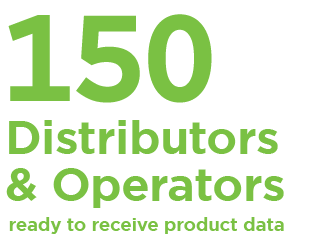

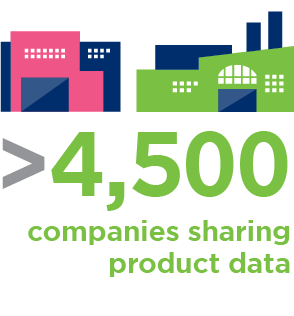
Goal = 75% GDSN Adoption by Sales Revenue Based on Usage*
We measure adoption by company participation in the GDSN and then work with the industry associations to tie revenue to participating companies.


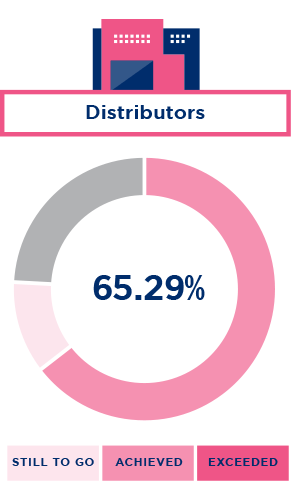
Operational Data
Companies share simple data (product dimension, weight,
etc.) to streamline the flow of products through the supply
chain. Totals as of September 30, 2015.
Number of Products Being Shared
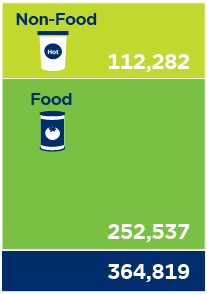
Sales Data
Companies begin sharing richer product data including
marketing descriptions, images, allergens, and nutritional
information to increase customer trust and sales. Totals as
of September 30, 2015.
Number of Products Being Shared
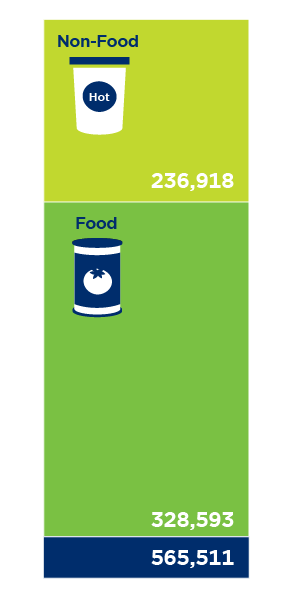
Operational and Sales Data
Totals as of Q3 2020.
Total Products in GDSN
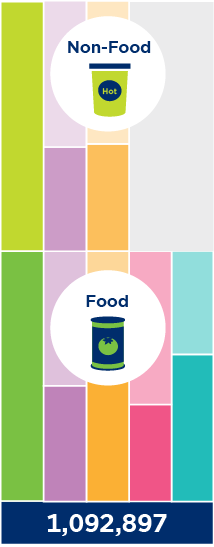

“ Shamrock has seen a 20 percent increase in sales and a 14 percent increase in demand for those products that have extended data attributes such as nutritional information and images.” Bryan West
Senior Director of Information Systems
Challenge
Shamrock Foods (Shamrock) needed complete and accurate
data for its web-based ordering system to satisfy the
increasing demands of its customers, especially healthcare
providers and school systems that require nutritional and
allergen information before purchasing. The company also
understood how using quality data could help it become
more efficient and cut costs throughout its operations.
Solution
The Shamrock team created a new supplier connection
process for its vendors to publish their product data and
images in its electronic ordering system for customers.
The team used multiple venues to reach its suppliers,
requesting their participation and offering guidance via
the Foodservice GS1 US Standards Initiative. Today, more
than 500 Shamrock suppliers publish detailed product
information as well as share and synchronize data via the
GDSN.
Benefits
Shamrock advises it has experienced a 20 percent increase
in sales and a 14 percent increase in demand for those
products that have extended data attributes such as
nutritional information and product images. The company
has increased its level of customer service by providing
extended product information to help them make better
buying decisions.
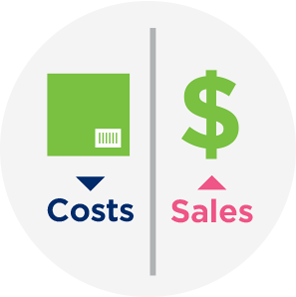
“ While quality data can reduce costs, we have found it significantly increases sales.” Cullen Andrews
Director of National Accounts
Challenge
Dot Foods (Dot) introduced its online product
catalogue—the Dot Expressway®
(Expressway)—18 years ago to provide better search
capabilities for its customers and sales representatives.
With about 105,000 products from 700 suppliers, Dot wanted
to fully leverage its market advantage by expanding and
enhancing the Expressway with more complete and accurate
product information.
Solution
Dot launched a data quality initiative that transformed
the Expressway to include expanded and validated data
attributes. Dot suppliers publish core item attributes
such as case dimensions and weights as well as marketing
and nutritional information like ingredients, allergens,
and images through data pools that are then synchronized
with Dot's system via the GDSN.
Benefits
Today, the Dot Expressway receives about 1.5 million hits
per month from its users, including nearly 2,800
distributors and 310 national account operators.
Distributors and Dot's sales representatives use the
Expressway when selling to customers for increased sales.
With accurate data, Dot has reduced costs with improved
warehouse management, load optimization, and increased
productivity.

“ With accurate, up-to-date data we can optimize truck loads, maximize freight costs, and be more competitive in the marketplace. That's the power of automated quality data.” Steve Reiling
Director of Non-Foods Purchasing and Supply Chain Initiatives
Challenge
Texas food distributor, Ben E. Keith Company serves 18,000
foodservice operators in 11 states throughout the
Southwest. When automating operations, the company knew
that complete and accurate data was a critical component
to effectively transform processes, making every part of
its business more efficient and responsive to customers.
Solution
Ben E. Keith launched a quality data program that enables
manufacturers to publish—via data pools—core
data attributes, marketing and nutritional information,
and images that are then synchronized with the company's
system via the GDSN. Entrée, the company's e-commerce
application, delivers this complete, up-to-date product
information to customer desktops or mobile
devices—allowing them to research products, place
orders, check on deliveries, and much more.
Benefits
Ben E. Keith manufacturers that supply some 80 percent of
all products are participating in the company's quality
data program. With easy access to better product data, Ben
E. Keith sales reps can more easily sell and serve
customers for increased sales. All aspects of the
company's operations, from purchasing to logistics, are
using quality data to increase efficiencies and improve
customer service.

“ We estimate just over a million dollars in transportation and material handling costs alone will be avoided going forward—just by achieving accurate data for these 83 products.” Lucelena Angarita
Director, Supply Chain Traceability
Challenge
Independent Purchasing Cooperative (IPC) is a SUBWAY®
franchisee-owned and operated purchasing cooperative. With
an eye on freshness and quality, IPC wanted to achieve
traceability of suppliers' products as they travel to
SUBWAY® restaurants. To do this, IPC
realized it needed accurate product data, yet found
widespread inaccuracies that were adding costs and
inefficiencies throughout its supply chain.
Solution
IPC launched a data quality initiative, using the GDSN. As
suppliers publish core item data in the GDSN, IPC reviews
the data for inconsistencies. Using GS1 best practices for
packaging measurements, distributors conduct physical
product audits to identify further data discrepancies.
Suppliers then update their product data in the GDSN,
creating a single source of truth for all partners.
Benefits
Suppliers have published 90 percent of product data by
volume in the GDSN, making corrections as IPC and its
distributors identify discrepancies. In addition, 89
percent of distribution centers are receiving and working
on integrating this product data into their management
systems for improved transportation, logistics, and
warehouse management. IPC estimates significant costs
savings; for example, after achieving accurate data for 83
major products, IPC estimates approximately a million
dollars in cost avoidance in material handling and
transport costs alone.
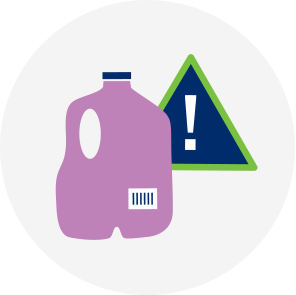
“ We are seeing an increasing number of withdrawals and recalls due to allergens and incomplete labeling. It's becoming more and more important that we work together to share complete data, and if needed, to quickly and accurately find product.” Syndee Stiles
Vice President, Operations Support
Challenge
With more than 3,600 restaurants in 18 countries,
DineEquity is one of the largest full-service restaurant
companies with two iconic American flagship
brands—Applebee's® and
IHOP®. The company wanted to take steps to
achieve traceability for increased food safety for its
franchisees' restaurants and their hundreds of thousands
of customers who dine at these restaurants each day.
Solution
DineEquity is collaborating closely with McLane
Foodservice (McLane), an industry supply chain leader and
one of its major distributors, to implement case-level
traceability across its entire system. Drawing on McLane's
experience with GS1 Standards, DineEquity approached its
suppliers about the value of using GS1 Standards. Today,
many of DineEquity's suppliers use GS1-128 barcodes that
carry detailed product information to its distributors'
centers.
Benefits
Taking a standards approach, all players in the
foodservice supply chain can streamline their processes
and gain efficiencies by using quality data. DineEquity
and McLane know precisely what products have been
delivered to the exact restaurant locations for faster,
more precise recalls and withdrawals, if required. This
leads to improved food safety, brand protection, and
continued consumer confidence.

“ Getting complete and accurate data is an industry movement now—not just one company requesting, but multiple voices asking for what they need to be successful.” Dave Devlin
Vice President of Vendor Engagement
Challenge
Representing more than 450 distributor members and 960
locations, UniPro Foodservice (UniPro) continuously looks
for ways to help its members gain efficiencies while
meeting evolving customer demands. Increasingly,
foodservice operators expect and need valuable allergen
and nutritional data. With more than 138,000 products from
manufacturers, UniPro members needed an effective way to
search for and access complete and accurate product data.
Solution
UniPro worked closely with member advisors to create the
UniPro Master Data Management (MDM) Portal. Using data
pools, manufacturers can now electronically publish core
attributes and marketing and nutritional attributes. All
data is then synchronized and shared with the MDM Portal
via the GDSN, giving members an efficient way to access
quality product information and images.
Benefits
Manufacturers can now quickly distribute comprehensive
information about their products to UniPro's hundreds of
member locations. Sales representatives and members also
save time when researching products and can make more
informed selling and purchasing decisions. UniPro believes
its members and their customers are happier with easy
access to allergen and nutritional information.

“ With accurate and complete product data at our fingertips—direct from suppliers—we knew the benefits would be significant for our customers, our sales reps, our purchasing department, and even our suppliers.” Kevin Ahnert
COO, Pocono ProFoods
Challenge
Pocono ProFoods’ eight-person purchasing department spent significant time each day handling inquiries from sales representatives, customers, and in‑field buyers, requesting information about its vast portfolio of products. As demands for information grew, the mid-sized distributor decided to create a data management system comprised of complete, supplier-provided product data for efficient access by all.
Solution
The company launched an initiative that required suppliers to publish their product information via data pools and the Global Data Synchronization Network™ (GDSN®). Taking a step-by-step approach, the team implemented a campaign to collaborate with suppliers in publishing accurate and comprehensive product data, and then provided sales reps and their customers with online access to this information.
Benefits

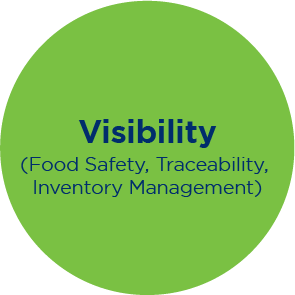
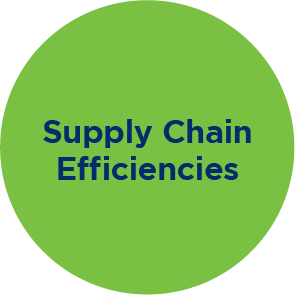
To learn more, contact us at foodservice@gs1us.org